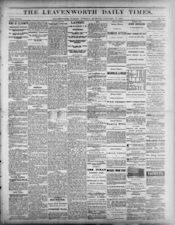Daily Times [Leavenworth, KS], December 6, 1860
Description of His Personal Appearance—A Short Biography of Him.
[Correspondence of the New York Tribune.]
Boston, Nov. 27, 1860.
James Montgomery, whose recent operations in Kansas are now attracting considerable attention, was here last Summer, and I saw something of him. In person he is tall and straight, of spare but highly nervous organization, and with a step as elastic as an Indian’s. Judging by the pictures of Col. Fremont, I should say that he and Montgomery resemble each other strikingly in their physical characteristics. Montgomery is a very different man from John Brown. Brown, in company, sat apart, evidently possessed by an idea, and determined to fulfill his mission in the world at all hazards. Montgomery sat at table and ate his dinner like other people, giving you the impression that he was a brave, frank, open-hearted, sincere and honest man, who would do his duty, but would cautiously consult his friends, and try to adopt the best means of reaching the result desired. Brown depended upon his despotic will; Montgomery evidently relies upon the influences of common sense, of which he possesses a great deal, to exert its proper sway over his associates. I have obtained some particulars of his history. He was born in Ashtabula County, Ohio, but emigrated to Kentucky when he was 15 years old. He at first undertook the profession of a school teacher, and also learned the carpenter’s trade. By joint brainwork and hand work he soon acquired a competency. At an early age he married a Kentucky girl, of highly respectable family, with whom he lived four years. She died, leaving no children. Soon after this he lost all his property by a heavy freshet, which carried off his mill-dam which he had begun to build. He now was obliged to begin life anew—wife and property were gone, but the cool head and strong hands remained. After awhile he married again. His second wife was a young girl of the neighborhood, uneducated, and of simple manners. She has become the mother of seven children, the eldest of whom is a stout girl of sixteen. During her husband’s absence upon his numerous expeditions to defend his own home and those of his neighbors, she provides for the family. At one time, when they were destitute of provisions, she waded through the snow to the woods, and with her gun procured game enough for the support of her household until relief came.
After several years of hard work in Kentucky, Montgomery, being obliged to compete with slave labor at $1 a day, found himself unable to improve his condition; so he resolved to remove to Missouri. Selling all his property except his chest of tools, he, with his own and wife’s family, went to Cincinnati, and there took passage for St. Louis. He had only $1.50 in his pocket when he arrived there. Failing to obtain employment, he pledged his chest of tools to the captain of a Missouri boat for a passage up the river, and on arrival requested the captain to take such tools as he preferred for payment. But the offer was declined, the captain generously telling that he would wait for the money until he could conveniently pay it. Montgomery stayed in Missouri a year, supporting himself by his trade in Summer and by teaching school in Winter. In the Summer of 1855 he proceeded to Lawrence, intending to pre-empt a homestead for himself in Kansas. He was disappointed to find most of the best claims occupied, and so he continued his search Southward to Linn, where he bought the claims of two Pro-Slavery men who had become tired and desirous of getting back to Missouri, and so were willing to sell at almost any price. He finished their cabin, and, returning to Missouri for his family, conducted them to their new home. He then went back to Missouri for a time, in order to complete a contract for work, and returned in the Spring with $200, the fruit of his Winter’s work. A gentleman who visited him not long ago says that his farm is the best he saw in Kansas. It consists of 240 acres, a large part of which has been placed under cultivation by himself and his boys. He is a good judge of cattle, and takes much pleasure in pointing out their fine points, and he delights to anticipate and describe the improvements which he intends to make when quieter times and a greater degree of prosperity shall give him the means.
Montgomery’s experience in Kentucky and Missouri had convinced him of the bad policy of Slavery, and upon leaving Missouri he became thoroughly Anti-Slavery in his opinions. Therefore, although he remained quietly on his farm, he soon became a prominent mark for Border Ruffian malice. Several attempts were made to assassinate him, and on one occasion, being set upon by three men, he narrowly escaped their bullets by hiding all day in the timber on the creek. Finding his home the most dangerous place he could remain in, he took up arms, and, collecting a few of his neighbors, commenced reprisals on his assailants. His exploits from 1856 to 1859 are matters of history, and I will not undertake to recapitulate them. The most readable and trustworthy account of them may be found in a volume written by William P. Tomlinson, entitled, “Kansas in 1858.” The events of 1858 were followed by a pacification, under the auspices of Gov. Denver and Montgomery, and an era of good feeling existed for a considerable time. Judge Williams and Montgomery took part together in a celebration in honor of the restoration of peace, and Montgomery’s operations were generally regarded, even by his enemies, as justified by the state of the country and the necessities of the Free State settlers.
